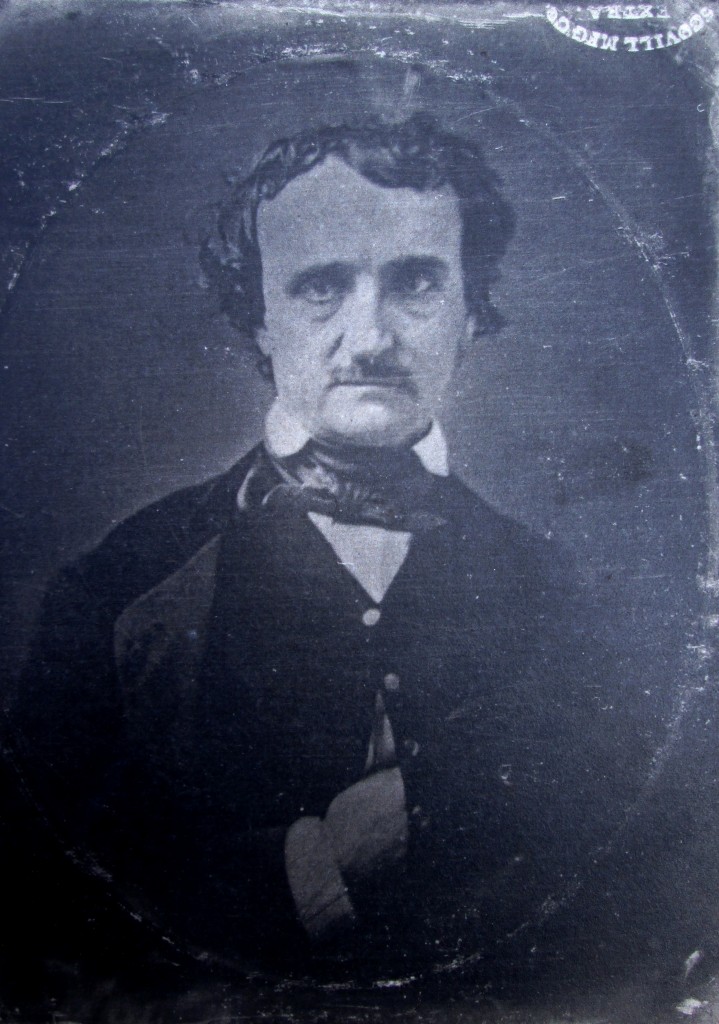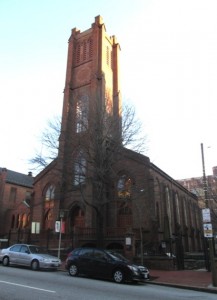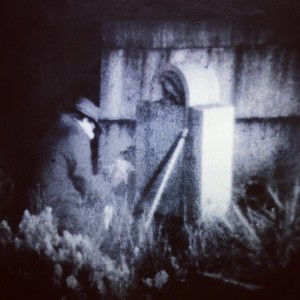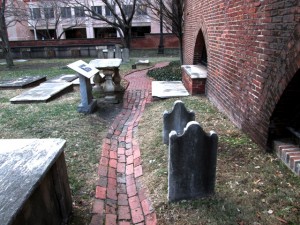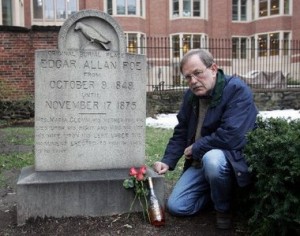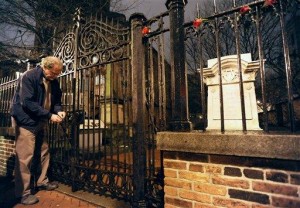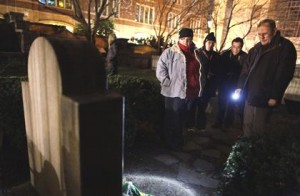(by Corbo Eng)
For a man who, during his lifetime, wrote about mystery (and imbued his stories and poems with it) and for one who died under such mysterious circumstances himself, Edgar Allan Poe, if he could have known, may very well have relished the on-going mystery that continues to be associated with his name—now, more than a century and a half after his passing. What mystery is this? It’s the on-going mystery of the so-called, “Poe Toaster,” a man whose motives and real identity, to this day, remain unknown.
The Poe Toaster is (or, more correctly) was a man (with, at least, one successor) who offered a toast to Poe, with French cognac and three roses—usually between midnight and 2 a.m. in the early morning hours of January 19th on Poe’s birthday—by visiting his grave at the Westminster Hall and Burying Ground in Baltimore. Invariably enlisting the cover of darkness, a black coat, a hat, and/or a scarf as allies, the Poe Toaster would sneak stealthily onto the cemetery grounds—offer his toast in a span of less than ten minutes—always leaving a half-bottle of the cognac and the roses in a signature configuration next to Poe’s simple tombstone in the back of the cemetery.
The first mention of the Poe Toaster occurred when his toast of 1949 was referenced in the newspaper; but, there, apparently was not any corresponding surge in public attention for quite some time after that. Indeed, for the vast majority of years (through the decades of the 50s, 60s, and into the 70s), the annual toast to Poe was a very low-key personal affair between the Toaster and Poe himself. The Poe Toaster’s fame and notoriety did not really grow, with much increased national and international attention, until the late 1970s. It was not until 1978 that the phenomenon of the Poe Toaster, as we know it, really started in earnest with the presence and involvement of Jeff Jerome.
It was at this time that Jerome, who started as a tour guide at Westminster Hall and who later would become the curator of the nearby Poe House and Museum, began his long-standing ritual of waiting for the Poe Toaster to arrive. At first, hiding in his car and then, soon thereafter, establishing a regular perch from inside Westminster Hall itself, which overlooks Poe’s grave, Jerome did, in fact, see the shadowy Toaster each year (but never so clearly that the Toaster’s identity became known to him). By design or by default, Jerome had become responsible for collecting the bottle of cognac that was left annually at Poe’s tombstone. But, he would become more than just a collector of bottles. At first, Jerome may have simply acted on curiosity with, at least, some muddled impulse to “unmask” the Poe Toaster; but, Jerome’s role quickly evolved into one whose job it was to preserve and protect the tradition as its guardian and caretaker.
For the Poe Toaster, as the decade of the 1980s ended, this was a most fortuitous circumstance. In 1990, Life Magazine set up a motion-activated camera, loaded with infrared film, at the Burying Ground in an attempt to capture an image of the Poe Toaster; and, incredibly, it worked. The camera, in fact, captured a dark, grainy photograph of the Toaster as he knelt at the gravesite. It, in no way, revealed the man’s true identity; it was too blurry. But, there was a discernible figure; and, the Poe Toaster’s walking cane was noticeably propped up against the tombstone. As the photo was subsequently published, the Toaster’s fame grew—as did the mystery surrounding him and his annual ritual. With the public, now, increasingly aware of the Toaster and with crowds gathering each year by the Burying Ground’s main gate to await his arrival (perhaps, with some, wanting to accost him), Jeff Jerome became indispensable.
He ensured that the Poe Toaster had, at his disposal, other ways of getting into the cemetery other than by simply walking through the main gate—likely leaving other gates unlocked (or by providing secret passage through the catacombs beneath Westminster Hall); but, Jerome, who has granted few interviews on the matter of the Poe Toaster, has not to date disclosed how, in fact, the Toaster seemed to pop up magically every year in the cemetery even as gawkers and onlookers scratched their heads waiting for him. More importantly too, Jerome, also, has been silent on another matter—one regarding a set of hand-signals that the Poe Toaster devised to indicate that he, in fact, was the real McCoy and not an imposter (hand-signals that took Jerome a few years to figure out and that, afterwards, only he and Toaster knew and shared).
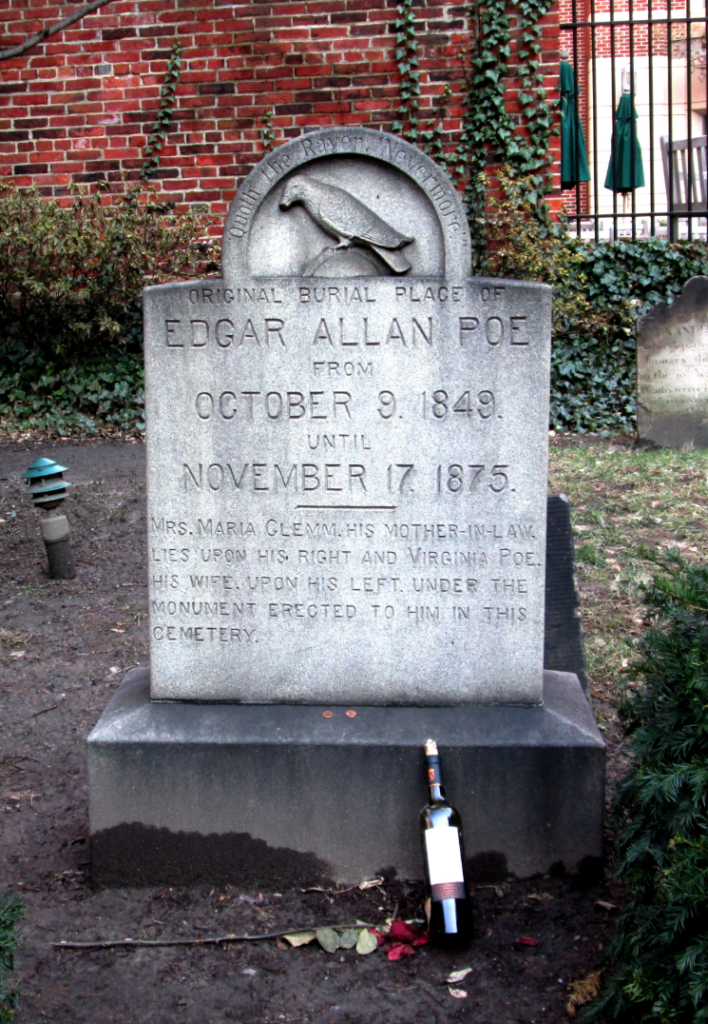
Poe’s original grave site (in the rear of the cemetery) where the Poe Toaster offered his annual toasts
It is quite likely that the Poe Toaster realized, as he was growing older (and, perhaps, growing more frail or, else, due to illness), that he could no longer continue—and, he wanted to share that news with his followers. Whatever the case may have been, starting in 1993, he began the practice of leaving notes along with the cognac and roses. The first note simply stated that “a torch will be passed.” Considering that the Toaster had not communicated anything…had not shared his thoughts at all during the preceding 44 years, this glimpse into the circumstances of his life (if, in fact, that is what it was) was not only completely and utterly unexpected—but, also, cryptic as well. What did it mean? Subsequent notes in the ensuing years, less consequential, made allusions to Poe’s work and offered devotions to the author. Then, in 1999, the note left at the Burying Ground hinted that the Poe Toaster himself had died and that the tradition had passed onto his sons. The Poe Toaster was dead? And, his sons would be taking over? This was a bombshell that, certainly, connected the dots left from the note of 1993; but, it trumped it for sure.
Since Jeff Jerome was already the one who collected the half-empty bottles of cognac that the Toaster left (and the one who decided to always leave the three roses at the tombstone as part of the tradition), becoming the arbiter of the notes was a natural extension of his duties. This not only involved physically taking the note that was left by the Toaster at Poe’s tombstone each year but, also, more importantly, revealing its contents (presumably, through media outlets of his choosing). Invariably, the newspapers and local TV stations would report on what was written the morning of each year’s visit.
That this was so was immensely important because the notes became much lengthier. It became clear that, as the original Toaster’s sons (perhaps, taking turns each year) took over the role, they wanted to communicate with the public-at-large. For example, in 2001, the Poe Toaster’s note was the longest to date and actually addressed matters beyond the Toaster himself or sentiments about Poe’s work. Incredibly, he weighed in on the Super Bowl, which would be played in nine days—and, which, incidentally, pitted the Baltimore Ravens against the New York Giants:
“The New York Giants. Darkness and decay and the big blue hold dominion over all. The Baltimore Ravens. A thousand injuries they will suffer. Edgar Allan Poe evermore.”
It was shocking to say the least on so many fronts—the least of which was the fact that the Toaster had sided with the Giants and not the Ravens (the Ravens…who were named for Poe’s most famous poem and enduring symbol). The larger, perhaps, more alarming issue (and the one that concerned Jeff Jerome) was that the Toaster—and, really, the person of the Poe Toaster as his sons had re-envisioned him—had anything at all to say about something as pedestrian and seemingly tangential as a football game (even if it was the Super Bowl). Clearly, the mystique of the Poe Toaster had taken a hit.

Brandon Stokley catching a touchdown pass for the Baltimore Ravens in Super Bowl XXXV (photo by the AP)
Another hit would come later. In 2004, in that year’s note, the Poe Toaster had taken on matters that were more substantive than just football. He wrote:
“The sacred memory of Poe and his final resting place is no place for French cognac. With great reluctance but for respect for family tradition the cognac is place [sic]. The memory of Poe shall live evermore.”
As news reports suggested that morning, the Toaster, apparently, was critical, now, of France—as many at the time were for its opposition to the Iraq War—despite the Toaster’s longstanding association with French cognac (even as it was, curiously, never mentioned in any of Poe’s works). The fact that the Poe Toaster would share a partisan political opinion—and with such awkward and sloppy phrasing (and with a grammatical error)—was, surely, unfortunate and clearly marred the tradition much more so than any football prediction probably ever could. At least, the prediction, back in 2001, had cleverly alluded to Poe’s works.

Freedom Fries listed on the menu at one of the Congressional cafeterias on The Hill (photo by Ian Everhart)
In addition, the remarks also seemed to mirror the absurd “reluctance” that some critics had over eating French fries, one of the country’s most iconic and recognizable foods, because it had French origins. During 2003 at the height of the war debate, some of the most partisan voices, notably Representative Bob Ney of Ohio, had even advocated that French fries be renamed “Freedom Fries” in order to expunge the offending use of the word “French.” Several Congressional cafeterias on The Hill amended their menus to reflect the perceived outrage. It was all, ultimately, silly and petty; but, was the Poe Toaster actually, by inference, part of the French-bashing wave of critics that were so vocal at that time? Regrettably, to Jerome and most others, it sure seemed that way.
As bad as that note in 2004 was, Jeff Jerome has indicated that there were actually some afterwards that were so objectionable (perhaps, because of content, wording, or both) that he kept the notes to himself. On those occasions, Jerome deceived reporters by saying the Poe Toaster had not left any note at all—but, merely the usual cognac and roses. What those censored notes said…no one but Jerome knows; but, it is easy to conclude that he, in his role as caretaker of the tradition, held back those notes so that no more damage would be done and that the original Poe Toaster’s dignity and mystique, which Jerome cherishes so much, would not be further tarnished by carelessly or clumsily worded notes. For him, the Poe Toaster’s comments about the Baltimore Ravens and French cognac had done quite enough. Besides, the original Toaster’s sons, whose notes clearly showed that they viewed the the tradition less seriously, also did not dress in the iconic black garb for which the Toaster had become known or carry a walking stick. Instead, they dressed in casual attire to look like anybody on the street. While the public had no knowledge of this, it certainly irked Jeff Jerome as well that the Poe Toaster no longer really looked the part.
After 2004, with that note about the French cognac behind him, the annual visits by the Poe Toaster, at least, as reported, were subdued and uneventful. So, as 2009, the two-hundredth anniversary of Edgar Allan Poe’s birth approached, no one knew what to expect. Indeed, despite the low-key visits of the preceding four years, 2009’s visit had the makings of something special. But, altogether, the visit was a letdown and disappointment. While the numbers outside the Burying Ground each year had always been sizable, there was, ironically, a lighter than usual turnout. The Poe Toaster came at his appointed time under the cover of darkness, slipped into the cemetery as usual, gave his toast with the cognac and three roses, but had left no note…no note. Jeff Jerome had expected one—one with something substantive to mark the anniversary and, as it turned out, to close out the tradition; but, that was not the case.
In 2010, the Poe Toaster did not make a visit. It was the first time that anybody could remember, since the tradition started, that the Poe Toaster had not come. On the face of it, the tradition seemed as if were finally over; and, it made sense. There was undeniable symmetry and symbolism in ending the tradition in 2009. One could very well imagine the original Toaster telling his sons (perhaps, in 1993 or 1998) as he neared his final call, to take up the “torch” after he was done and to make sure to continue the annual toasts until 2009, Poe’s 200th birthday—an eleven year commitment. With reluctance or not, whether gladly or seeing it as a chore, the sons had continued the tradition until then.
However, Jeff Jerome was reluctant to admit that the tradition had ended. Perhaps, something had prevented the Toaster from showing up in 2010—a flat tire, maybe. He wanted to wait for the Toaster again in 2011; and, like he always had, that is what Jerome did by taking his usual position inside Westminster Hall overlooking Poe’s grave to watch for the Toaster to arrive. But, the Toaster did not come. Still, Jerome was not satisfied. Perhaps, he wanted and needed some sort of symmetry of his own—not 60 years worth but three…something along the lines of “three strikes and you’re out.”
Jerome wanted to establish three no-shows before officially declaring that the tradition that had been such a huge part of his life was, indeed, really, officially over. In 2012, as the clock struck midnight and the hours passed (and as darkness faded into dawn), the Poe Toaster had not come again. The third no-show had come to pass. One could imagine Poe’s Raven, flying over the Burying Ground or, perhaps, watching from a nearby perch, secretly enjoying the fact that everyone was so beguiled by the apparent end of the tradition. It would have been entirely in character. But, in the end, maybe, it was as it should have been—with mystery, Poe’s calling card, lingering, seemingly, for perpetuity.
Copyright 2014 (Corbo Eng). All Rights Reserved.
All photos by Corbo Eng (unless otherwise stated).

